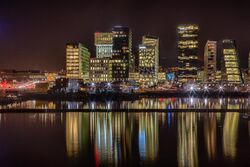Oskarsviik
Oskarsviik | |
|---|---|
Capital City | |
 Oskarsviik Skyline | |
| Etymology: Normanish: Bay of King Oscar the prosperous | |
| Nickname: City of the golden river | |
| Country | Greater Normark |
| Administrative District (region) | Oskarsviik |
| Founded | May 25, 1615 |
| Founded by | Kristian Frederik I |
| Government | |
| • Chairman | Josefin Lindberg (S) |
| Population (2020) | |
| • Total | 2,127,839 |
| Website | oskarsviikcity.gov.nmk |
Oskarsviik is a port city on both sides of the river Bjurå in central Greater normark and also the country's administrative capital. It's municipality has a population of 840,000 which makes it the most populous city in Greater Normark. It's metropolitan area has a population of 1,800,000, which also makes it the most populous region in Greater Normark. It was established in 1632 by Kristian Frederik I when he merged the towns of Viik, which had been the capital of the kingdom of Viik, Grønlycke and Bergsjø to create a new capital city for newly established kingdom of Normark. The capital had been Jakobsberg, which nowadays is a part of the urban area of Oskarsviik, but Kristian Frederik I thought it would be more strategic to have the administrative capital to be a port city that stretched both sides of the river of Bjurå while at the same time keep the royal administration in Jakobsberg. Oskarsviik was named after the father of Kristian Frederik I, Oscar II.
The city, which already had a big population due to Viik being one of the most populous towns during the early 17th century, quickly gained in population due to it being placed on a strategic river and close to the two most inhabited lakes of Normark. It quickly merged together with other close towns, like Jakobsberg, Hvaalviik and Rese, which also helped with the quick population boom. It was also the centre of the industrial revolution in Normark during the latter half of the 19th century and it quickly rose to the by far largest city in the kingdom of Greater Normark.